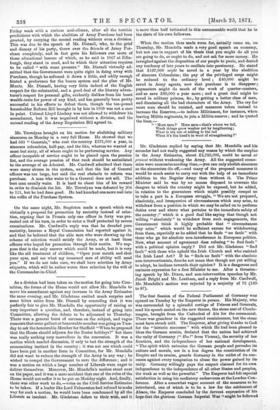As a division had been taken on the motion for
going into Com- mittee, the forms of the House would not allow Mr. Mundella to move his amendment against any increase in the Army Estimates the same evening, and Mr. Gladstone excited much surprise and some bitter satire from Mr. Disraeli by conceding that it was perfectly fair to give Mr. Mundella the opportunity of raising so very important a question, and, therefore, instead of going into Committee, allowing the debate to be adjourned to Thursday. There was a general burst of sarcasm on the subject, and vague rumours that some gallant or honourable member was going on Tues- day to ask the honourable Member for Sheffield "When he proposed that the House should adjourn for the Easter holidays?" but there was really nothing very marvellous in the concession. It was a motion which needed discussion, if only to test the strength of the economizing instinct in the country ; it was not one which could have been put in another form in Committee, for Mr. A1undella did not want to reduce the strength of the Army in any way ; he wished to compel the Government to save the difference ; and it was a motion on which a large number of Liberals were eager to deliver themselves. Moreover, Mr. Mundella's motion stood next on the paper, and it was a mere accident that one of the rules of the House would not suffer it to be put on Moiday night. And, finally, there was other work to do,—votes on the Civil Service Estimates to be taken. If a leader like Lord Palmerston had refused to make way for such a motion, he would have been condemned by all the Liberals as insolent. Mr. Gladstone defers to their wish, and it is more than half intimated in this unreasonable world that he is the slave of his own followers.


































 Previous page
Previous page